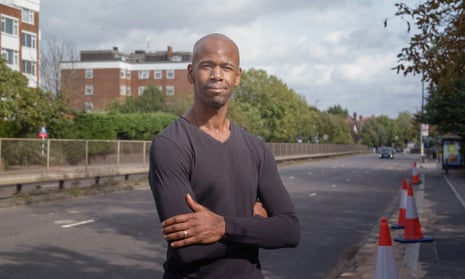For David Smith, the final straw came as he was standing at the bus stop near his home in south London with his two-year-old son Ely.
He had become increasingly aware of the damage pollution was doing to young people’s health since the birth of his two youngest children. And when the gridlocked traffic edged forward and a lorry pulled up a metre from Ely, something snapped.
“I realised this was simply not right,” said Smith, 47. “On a very basic level I was knowingly poisoning my two-year-old son and I had to do something about it.”
The two, who had been on their regular trip to the local skate park, turned round and headed back to the family’s first-floor flat overlooking a dual carriageway in Wandsworth.
From there, Smith has fought a year-long campaign to raise awareness of air pollution in his area that has seen him start petitions, launch a blog and meet local politicians. “I have put my energy into trying to deal with the problem because, if I didn’t, I think I would be overwhelmed with a real sense of helplessness,” he said.
The scale of the UK’s air pollution crisis has become more evident over recent months – especially its impact on children. Reports have emphasised the links between illegally poisonous air and heart disease, dementia, reduced cognitive ability and asthma deaths. Some local politicians are starting to appreciate the threat, but the government, which has lost three court cases over its perceived lack of action on air pollution, has been widely criticised.
Smith said that he first became concerned about the air pollution crisis after his two youngest children – a daughter, 10 months, and Ely, now three – were born prematurely and “on the cusp” of being underweight. His daughter has since suffered serious respiratory problems, and now has medication and medical equipment to help her breathe.
Sitting at his kitchen table, Smith says his wife, a lawyer in central London, travelled to work as usual during both pregnancies, walking along a busy road to the tube. “You can’t attribute these things definitively to air pollution but the more you find out the more you realise the huge damage it is doing to our children’s health,” he said.
The family, who do not own a car, now carefully plan every journey. They avoid main roads, the rush hour and busy bus stops wherever possible. But it is not easy. “There is only so much you can do when in a big city like this. To a certain extent, we have got to accept now that we are doing great damage to our children’s long-term health simply by living here.”
The family lives on a section of the A3 just before it joins the South Circular – two of the busiest roads in London. Every morning, queues of traffic form outside their home.
Ella Kissi-Debrah, a nine-year-old who died in 2013 after a series of respiratory problems, also lived close to the South Circular. Her mother, Rosamund, has fought to highlight the role she believes pollution played in Ella’s death.
For Smith, Ella’s case provides a warning. “That could happen to any child who regularly travels on – and attends school on – a busy road. That’s hundreds of thousands of children in London alone, and yet so little is being done to protect them.”
Smith is campaigning for exclusion zones around bus stops. Next month he is meeting officials from Transport for London to put forward proposals for a new traffic management system and a change to driving behaviour on the dual carriageway outside his house, which he calculates would lead to a huge reduction in pollution.But he says that there also needs to be a fundamental change in the way people think about air pollution: “People are not focusing on children’s health when they are thinking about air pollution, because if they were they would be doing something about it. If I can recognise that, I don’t see why politicians and policy makers can’t.”
